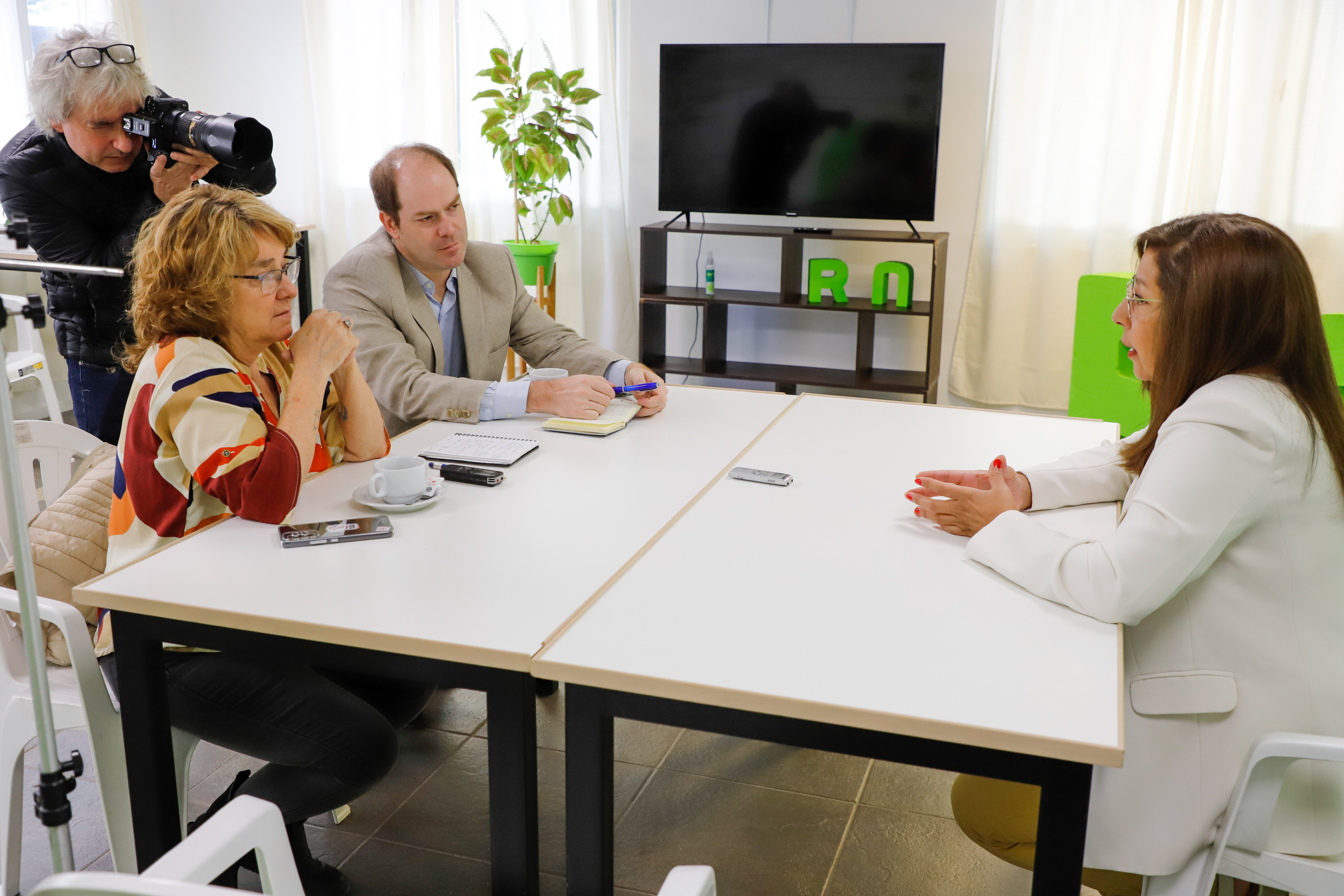Green Hydrogen
"We have the opportunity to transform the energy matrix".
"We have the opportunity to transform the global energy matrix. But this challenge must be supported by a perspective of sustainability that is not only economic or environmental, but also social". Governor Arabela Carreras made this statement, emphasizing the importance of Rio Negro's policies on renewable energies and the promotion of the Green Hydrogen Strategic Plan.
Fecha: 24 de marzo de 2023
"We work in continuous communication with the national authorities, but we also go ahead and are proactive", said the Governor and pointed out that Río Negro "has the necessary resources that allow it to project itself as a generator of clean energies".
Carreras gave an interview to the specialized magazine DEF, which deals with topics related to energy, science, technology and natural resources, among other issues.
The Governor emphasized the progress in the Green Hydrogen Plan and the arrival of the company Fortescue, with the support of a provincial strategy that offers the best conditions. "This is the largest investment in the country in recent years and it has positioned us as a region that is one step forward", she pointed out.
In this framework, Carreras explained that two aspects hardly taken into account in the global hydrogen agenda were added in Rio Negro: local development and social consensus. "This is an opportunity to discuss again many aspects in global relations. We are looking for a new model that is both comprehensive and global. Usually, a large investment by a multinational company in a given commodity produces income for the country and for the State's funds, but it also has unintended side effects, which lead to poverty and exclusion in the communities", she said.

"The increase in the price of land excludes local inhabitants and exacerbates the problems of access to land and housing. We developed the Río Negro Suelo Urbano program, which provides services and grants land at a very low price and in monthly payments to people who have been living on a certain plot of land for more than two years. It is a program that is being implemented throughout the province and the different municipalities are participating," she continued.
"We want to avoid excessive real estate speculation. The State intervenes to anticipate and prevent a sector of the population from being unable to have access to housing due to the increase in the price of land. Thanks to this program, we have mitigated in the province a process of land acquisition, which was taking place all over the country", she pointed out.
Also, actions were developed to prevent the arrival of new professionals from pushing the local population out of the new jobs. She mentioned the setting up of the Río Negro Más Trabajo program, which "trains staff and labor force, either from UOCRA -one of the main unions to move forward with the construction of the project- or from the service sector".
"We know that training the population takes time and if we start doing it when the investments arrive, it is already late. That is why, together with the Nation and the unions, we develop massive programs that have certification. And we address labor issues, from the most basic to university training and diplomas. This type of programs goes beyond hydrogen and we are implementing them throughout the province", she mentioned.
Social consensus
"There are certain speeches that are not reliable in the eyes of the population, for example, the political speech and that the population looks for certainties anywhere else. Therefore, we encourage the scientific-technological sector to explain the technical and social aspects and the opportunities that hydrogen will generate", said the Governor, when asked about the actions to achieve social consensus for a project of such magnitude.
In this framework, she highlighted that experts created “Hydrogen Thursdays” with presentations, a series of trainings with specialists in the territory were advanced and an informed consult model was organized for native peoples.

Leaders in defense of our resources
"We had a series of meetings prior to the execution of the commitment agreement with Fortescue. In all that previous negotiation, we established positions on the issues of social consensus and local development. We also agreed on an anti-corruption agenda. Although legislation already existed, it was already implemented in the context of the agreement," she explained.
"In Latin America, we are the owners of an invaluable resource in view of the energy transition process to come. Therefore, we have to clearly position ourselves as local and regional leaders in defense of our resources, and do so with a very clear concept of national sovereignty", concluded Carreras.
According to Carreras, this "will enable the negotiation to take place in the right terms and to have a positive global impact" because "we cannot think of our development in the short term or at a local level. We need to think in the medium and long term, with a global outlook to address the climate change in which we are immersed. Moreover, we become aware of the local impact and its global effects. This dialogue between the local and the global is what defines our strategic plan and our public policies".

Dialogue with native communities
During the interview, the Governor referred to the work carried out with the region's native communities. "The most difficult thing is to get the agreement of the communities among themselves. So that they can express an opinion regarding the protocol that I mentioned before and that was made up with actors from the different communities, from the Mapuche Coordinating Committee and from the Council for the Development of Indigenous Communities (CODECI), integrated by natives and representatives of the State", she said.
She pointed out that, in this case, the absence of a single view makes it difficult to respond as a whole. "There are those who have a conservative vision and others, who have a more developed vision and want to be part of the project because they understand that it is an opportunity for their children," she added.
The need for national legislation
On the other hand, the Governor once again stressed the need to advance in the national legislation that regulates the Hydrogen activity. "The necessary agreements are not yet in force. There are some key points that this legislation should include. On the one hand, the availability of the dollars produced, mainly to pay the debts acquired from the investment commitments. On the other hand, the VAT refund and the scope of the promotional regime," she explained.
Carreras pointed out that hydrogen "is a new project, with a non-existent market, with an international price that does not exist either, and a production that cannot be done on a low scale, if we want the project to be sustainable” that is why "a wide promotional regime is required".

The Climate Change Plan
"At the provincial level, we already have a concrete legal framework and we will also be the first province in the country to have a Strategic Plan on Climate Change, which we will present to the Legislature in March of this year," she said. She explained that this Plan consists of "an evaluation of the different factors that affect the generation of greenhouse gases in our territory".
She mentioned that there is already a very exhaustive initial diagnosis, prepared by university professionals and by a hired technical team. "We are working on different aspects; for example, on open-air landfills, livestock and productive activities. We have been working for many years on sewage treatment plants and we are one of the provinces with the highest sanitation coverage," she said.
Leading the energy transition
The Governor also referred to the work being developed in Río Negro to coordinate the development agenda for the future with the promotion of hydrocarbon activity, especially in the area of influence of Vaca Muerta.
"We are trying to lead the energy transition, and we conceive it with gas, fundamentally to replace coal, to supply it to the country and export it to the world", she concluded.
"Río Negro is the fifth hydrocarbon producing province in the country, but with a conventional production and declining wells. Moreover, we are exploring non-conventional hydrocarbons, since the Vaca Muerta formation reaches our territory. We are also working on projects for an oil and gas pipeline that will allow oil and gas production to be transported through the ports of Río Negro, which would mean an important development opportunity. In order to ensure the necessary transparency, we are carrying out all the required technical and environmental impact studies", she explained.
She pointed out that "it would be the shortest route for the exit of liquefied natural gas from Vaca Muerta and would allow us to transport the gas to the port of the area, which is a region of low population and which does not have a natural gas network". Regarding the possible installation of a gas liquefaction plant in San Antonio Este.
"The liquefaction plant project would not only facilitate transportation but would also allow us to expand and develop the whole area", she concluded.


